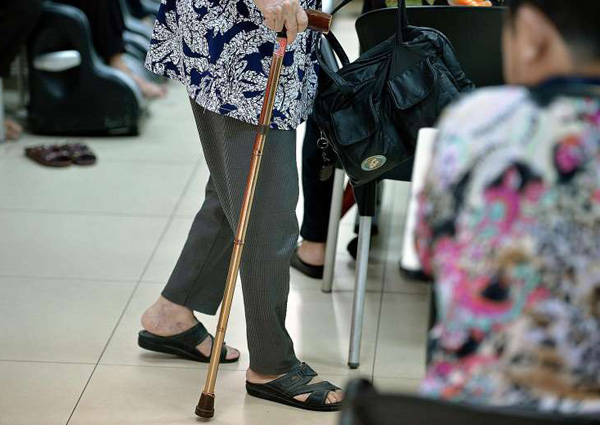Social workers have noticed an uptick in the number of cases of abuse by family members of vulnerable adults, such as those who are intellectually or physically disabled, or who suffer from dementia or who are mentally ill.
The training of more people in the community to spot cases accounts for the increase in the number of cases reported, they said.
Two of the three centres that specialise in tackling family violence have seen the number of such cases almost doubling in the past five years.
Care Corner Project StART, which started in 2011 and specialises in abuse cases involving vulnerable persons, saw 11 such cases in 2012.
Last year, it handled about 20.
Safe Centre, which focuses on abuse cases involving the elderly, saw 26 such cases last year, almost double the 14 cases in 2011.
Ms Kristine Lam, team leader of Project StART, said the organisation has been training hospital staff, grassroots leaders and people working with the disabled and the elderly, among others, to detect abuse.
With greater awareness, more cases are surfacing.
“These people (due to their conditions) may not know they are abused and can’t really cry out for help. So it really depends on the community to report the abuse,” she said.
Abuse ranges from financial exploitation to sexual assault, but mostly involves physical violence and neglect, social workers said.
An example cited was that of an intellectually disabled man in his 50s who also has schizophrenia.
His son, a student in his 20s, used cigarettes to burn him, bamboo poles to hit him, and tied his hands when he did not do as he was told.
This went on for at least 10 years before hospital staff spotted scores of cuts and bruises on the man.
Project StART social workers applied for a personal protection order for the man against his son and the violence has since stopped.
Violence aside, social workers say that neglecting to provide sufficient care to vulnerable adults who are unable to look after themselves is another concern.
Over time, neglect, including not being given medication regularly or taken to the doctor promptly, could lead to health complications and even death.
Said social worker Soh Siew Fong at Pave: “Neglect can kill.”
While there are caregivers who neglect their charges as they are overwhelmed by the task, social workers are more concerned about those with ulterior motives who intentionally neglect those under their care.
Said Ms Lam: “They are after the person’s money. So the sooner the person dies, the quicker they get the money.”
Some cases appear to be a means of taking revenge, she added, recalling the case of an elderly women whose husband, in his 80s, had dementia. The wife would dictate when he could be bathed and have his diapers changed. He was also not given his medication regularly and suffered a seizure – which led to complications and his death.
Ms Lam said: “We found out from their daughter that the wife wanted to punish him as they had a bad marriage. This is intentional neglect.”
Ms Odelia Chan, a social worker at TRANS Safe Centre, said caregivers who have ulterior motives usually reject all offers of help.
In one case, a woman lived with her intellectually disabled sister, purportedly to use the regular financial aid her sister gets from the Government. And she abused the sister by biting her when instructions were not followed. The abuse was detected during a hospital visit, when a nurse noticed blood that had seeped through the victim’s T-shirt. Hospital staff alerted TRANS Safe Centre and the woman was eventually placed in a shelter.
Social workers said these vulnerable adults are the most defenceless victims as some have no inkling that they are being abused, while others tolerate the caregivers’ actions.
WHERE TO GET HELP
If you are a victim of family violence or know someone who is, you can call these charities for help.
Pave
Tel: 6555-0390
TRANS Safe Centre
Tel: 6449-9088
Care Corner Project StART
Tel: 6476-1482

This article was first published on March 13, 2016.
Get a copy of The Straits Times or go to straitstimes.com for more stories.






